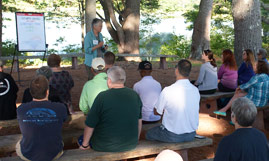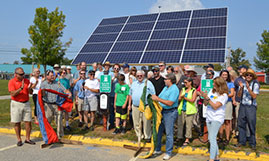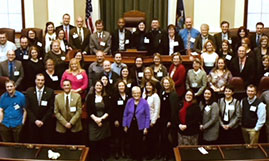FOR/Maine and Maine Development Foundation Announce Final Phase of Grants for Mill Site Redevelopment in Five Maine Communities
HALLOWELL, ME – February 2, 2022 – FOR/Maine (Maine’s Forest Opportunity Roadmap) – a broad coalition working to diversify the state’s wood-products businesses, attract capital investments, and develop greater economic prosperity for rural communities – and Maine Development Foundation (MDF) are pleased to announce the final phase of grants to five Maine communities impacted by mill closures.
This final $120,000 in funding brings the total amount awarded through the Increasing Prosperity for Maine’s Forest Economy Communities subgrant program to $1.2 million. The funds support redevelopment projects deemed catalytic for the next generation of forest products, especially during the critical transition in global markets. Funding was made possible by awards from the federal Northern Border Regional Commission and the Maine Rural Development Authority.
“This is a model for future work that can be replicated to continue transitioning these economies and make them more diverse and sustainable,” says Charlie Spies, FOR/Maine Communities Committee Chair, and retired CEO of CEI Capital Management. “This approach proves that a coordinated and concerted effort that focuses on regional needs rather than just one group or community can lift all ships and revive century-old, forest-based economies throughout Maine.”
This final round of investment in forest product assets is part of a process that has had fundamental impact on economic revitalization:
- Ashland – $20,000 to conduct engineering studies that will help prepare a 94-acre, former manufacturing campus for a new generation of industrial uses.
- East Millinocket – $30,000 to complete site planning on a vast section of greenfields on the Penobscot River as part of the redevelopment of the 215-acre former Great Northern Paper site.
- Lincoln – $20,000 to update Maine Department of Environmental Protection permits for several facilities in the former Lincoln Paper & Tissue campus to be repurposed for modern uses.
- Madison – $30,000 to update the engineering study and business model for industrial-grade waste-water processing at the former Madison Paper complex to convert agricultural and municipal waste into a renewable natural gas and power Timber HD’s nearby factory.
- Millinocket – $20,000 for electrical and heating studies of latent buildings in the Great Northern Paper complex to help determine future repurposing options.
“We are so grateful for the ongoing critical funding to make East Millinocket an even better place to live and work,” says Angela Cote, Administrative Assistant to the East Millinocket Selectboard. “We appreciate the tireless efforts of MDF to assist municipalities hit hardest by the closure of paper mills over the past several years. MDF’s collaboration with the Northern Border Regional Commission and the Maine Rural Development Authority has resulted in direct funding to help former mill towns rebuild.”
The Northern Border Regional Commission (NBRC) and Maine Rural Development Authority (MRDA) fund the grant program. They program is administered by the Maine Development Foundation, which staffs the FOR/Maine coalition and is a key partner in the coalition’s work.
“We are excited to play a role in funding this group of projects, and to see these funds go to support innovative efforts to diversify Maine’s forest-economy communities,” says NBRC Executive Director Rich Grogan. “It is also crucial that these investments support new forest products, furthering this industry’s rich tradition in Maine, and across the NBRC region.”
“The forest-products industry has been a critical economic contributor to rural Maine communities for generations, and with the right investments, it can continue to play a vital role in our state for years to come,” said Senators Susan Collins and Angus King, and Congressman Jared Golden in a joint statement. “The work of the industry-led FOR/Maine initiative has helped position this sector for continued success, and investments in these communities will bolster the development of new sustainable forest products, help support good quality jobs in each region, and take important steps toward our shared goal of revitalizing Maine’s forest economy.”







